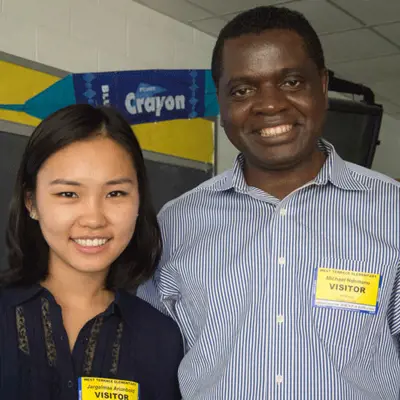
October 21, 2013
For Dr. Michael Ndemanu, who moved from Alou, Cameroon to the United States in 2006, teaching diversity, world culture, and socio-economic justice is a passion. It's a passion the assistant professor of multicultural education and English as a second language shares in his college courses, through his volunteerism with Habitat for Humanity and most recently the newly established Passport Club.
Since 2012, Ndemanu has run the Passport Club, which consists of international USI students who make bi-monthly visits to West Terrace Elementary School to share parts of their culture with the children. "You want them (the children) to understand different perspectives through exposure to different cultural practices," said Ndemanu. The USI students use videos, PowerPoint presentations, and music to tell stories about their native countries.
Ndemanu often reminds his students to leave plenty of time for questions. "Children are more curious; they ask a lot of questions," said Ndemanu. "Unlike children, adults are more sensitive and guarded about questions pertaining to diversity. They worry about offending someone." Because of this, adults often walk away with less understanding and knowledge. "I always tell my students I like curiosity. I like sharing my culture with people who are interested in learning about it," said Ndemanu.
In the area of pedagogy, Ndemanu teaches Diversity and Equity Issues in Education (EDUC 221) and Language, Literacy, & Culture (EDUC 381). The former is a core course required for education majors. He said that he comes across students who feel like there is a lack of diversity in Indiana. Ndemanu points out that diversity extends beyond race and ethnicity. In addition to those, there are socio-economic, gendered, and linguistic diversity. There is variation in the ways people from the Boston area and Mississippi speak English. "Teachers have to take into consideration students' needs, interests, experiences, and socio-cultural background in designing their curricula and instructions," explains Ndemanu. He has his students interview international students and ask them about healthcare policy, education, and social life in their countries. "As they learn about other cultures, they can reflect on their own, and how that can impact communication," said Ndemanu.
Ndemanu is a polyglot who speaks five different languages Ngwe, Kamtok, Yemba, English, and French. He taught French and English in his home country of Cameroon at the elementary, secondary, and tertiary levels. It was there where he also began a petition for socio-economic justice. His classroom, which held over 60 students, had only four benches with desks, leaving a majority of the students sitting on a cloth on the floor. Ndemanu and a colleague wrote letters to the government and, within two years, the schools had enough benches for all the students. Ndemanu weaves the economic struggles of the working poor and the effect it has on a child's education into his college lectures.
For his efforts, he recently was named a Phi Delta Kappa (PDK) Emerging Leader. PDK is an international association for educators. The recognition is given to those who show distinguished scholarship, advocacy of children and other professionals, and leadership skills. As a PDK Emerging Leader, Ndemanu will join 25 others in Washington D.C. in December to meet with education policymakers at the U.S. Department of Education to network and share ideas, and his passion. ♦